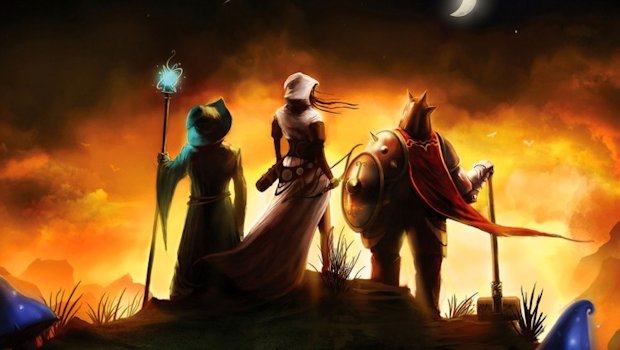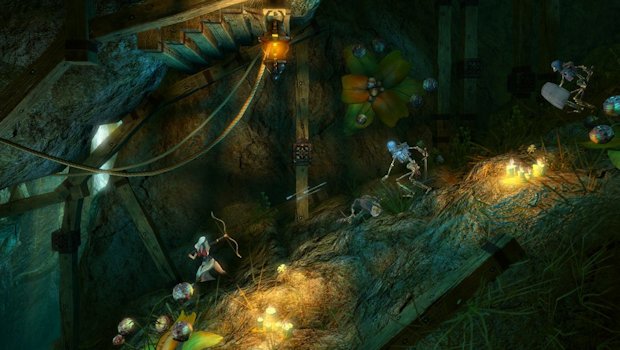Since I first experienced games like Donkey Kong and Popeye on arcade machines, I have been in love with platformers. What I loved about platformers was that the core focus is nearly always pure, skill-based gameplay. Progression in those types of games relies on the player figuring out the correct path(s) through a level. How does one get to this platform, while killing this enemy, in this position? While 3D platformers have at times strayed from this design philosophy, the genre, for the most part, always pits players against an expertly designed mouse trap. And I love it.
Being as I feel that platformers are basically puzzles themselves, I don’t particularly like the term puzzle platformer. But in regards to games that focus on puzzle solving as opposed to straight platforming, I suppose it serves its purpose as a genre modifier. Trine, from developer Frozenbyte, is one of these games. Kind of.
Selling itself as a puzzle platformer with physics, Trine delivers on its promise. There is platforming, puzzles, and its setting is affected by physics. Things like weight and momentum are important, and figuring out how the physics of the game world work is the key to figuring out the puzzles that at times bar your path. It is a simple formula but one that works.
What makes Trine stand out from other games that utilize this formula is that the character plays just as much a part in the puzzle as everything else. At the outset of the game we are introduced to three separate characters: a nimble, bow-wielding thief, a sorcerer that can summon physical objects, and a burly knight brandishing a sword and shield. After playing a short tutorial level with each character they meld together through a magic stone. Three personalities with different strengths and weaknesses rolled into one that can be switched on the fly. When enemies are on the screen the knight swaps in to fight them off. When a tricky jump or swing to a precarious ledge needs to be made, the thief shows off her skills. And when a little magic is called for, like conjuring a box to get to a higher ledge or a platform to cross a poisonous swamp, the wizard is there ready to go.
The thief is super nimble, and with her grapple arrow shot, I found I was able to escape most dangerous situations except for the occasional boss battle or puzzle that required the knight or wizard. Her play mechanics just worked best for me but I can see others maining the game as the knight or the wizard and having an equally enjoyable experience. And a lot of this comes from the fact that Trine is not particularly difficult. Neither the puzzles nor the combat ever got to a point where they overwhelmed me. I did have a couple moments of head-scratching as I momentarily lost the logic train the game operates on, but such occurrences were few and far between. I easily finished it within a few hours of play.
If there is one thing that I wish were better about the game, it would be the narrative. The characters all have lively and fun personalities but the story tying them all together is generic fantasy mush. Thankfully it doesn’t detract from the game’s fun factor any, and actually helps to showcase the gameplay even more. For me, Trine is easily recommendable to anyone looking for a little platforming action.

